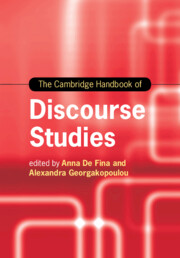Book contents
- The Cambridge Handbook of Discourse Studies
- Cambridge Handbooks in Language and Linguistics
- The Cambridge Handbook of Discourse Studies
- Copyright page
- Contents
- Figures
- Tables
- Contributors
- Preface
- Part I (Con)Textualizing Discourses
- Part II Perspectives and Modes of Analysis
- Part III Discourse Materialities and Embodiment
- Part IV (Trans)Locations and Intersections
- 17 Transnationalism, Globalization and Superdiversity
- 18 Translanguaging and Momentarity in Social Interaction
- 19 Intersectionality, Affect and Discourse
- 20 Expanding Academic Discourses: Diverse Englishes, Modalities and Spatial Repertoires
- Part V Ethics, Inequality and Inclusion
- Part VI Discourses, Publics and Mediatization
- Index
- References
19 - Intersectionality, Affect and Discourse
from Part IV - (Trans)Locations and Intersections
Published online by Cambridge University Press: 28 September 2020
- The Cambridge Handbook of Discourse Studies
- Cambridge Handbooks in Language and Linguistics
- The Cambridge Handbook of Discourse Studies
- Copyright page
- Contents
- Figures
- Tables
- Contributors
- Preface
- Part I (Con)Textualizing Discourses
- Part II Perspectives and Modes of Analysis
- Part III Discourse Materialities and Embodiment
- Part IV (Trans)Locations and Intersections
- 17 Transnationalism, Globalization and Superdiversity
- 18 Translanguaging and Momentarity in Social Interaction
- 19 Intersectionality, Affect and Discourse
- 20 Expanding Academic Discourses: Diverse Englishes, Modalities and Spatial Repertoires
- Part V Ethics, Inequality and Inclusion
- Part VI Discourses, Publics and Mediatization
- Index
- References
Summary
This chapter argues for the importance of intersectionality as a heuristic framework through which to understand how identities and emotions are produced in discourse. The chapter begins with a historical overview of theoretical discussions around intersectionality. Particular focus is put on the ways in which intersectionality has been recently rediscovered in different strands of research on language in society. The chapter then moves on to showcase discourse analytical work that has operationalized intersectionality with the help of a variety of techniques such as conversation analysis, online ethnography and multimodal critical discourse analysis in order to understand the social and political life of three emotions: hate, desire and shame. The chapter closes with a few reflections about future avenues for further investigation such as the domain of hope and its potential for social justice and sociopolitical change.
Information
- Type
- Chapter
- Information
- The Cambridge Handbook of Discourse Studies , pp. 417 - 436Publisher: Cambridge University PressPrint publication year: 2020
References
Further Reading
This monograph offers an illuminating analysis of the relationships among bilingualism, gender, sexuality, ethnicity and race among Latinx in the United States.
This insightful special issue illustrates how intersectionality can be analytically useful in the study of queer lives in a variety of contexts.
This important edited collection showcases sociolinguistic studies that operationalize the notion of intersectionality with the help of different analytical and methodological techniques.
This useful book summarizes debates about emotions and affect in the social sciences and offers clear examples of the ways in which discourse analysts can go about analyzing emotions in discourse.
References
Accessibility standard: Unknown
Why this information is here
This section outlines the accessibility features of this content - including support for screen readers, full keyboard navigation and high-contrast display options. This may not be relevant for you.Accessibility Information
- 2
- Cited by
